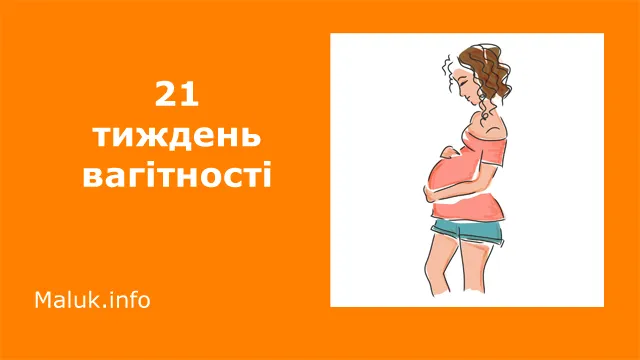Pregnancy calendar: 21st week of pregnancy
Pregnancy calendar by week. An experienced doctor tells how a child develops in the womb and what changes occur in the pregnant woman’s body. All the most important things about the 21st week of pregnancy
Changes in your body:
The fifth month of pregnancy is a good time to devote to yourself and your partner. I advise you to organize a romantic trip for two. The advantage of taking a vacation together is that it’s really a time when you can relax, recharge, just get some sleep before the upcoming marathon. And, secondly, you will have time to communicate, talk about what worries you, and perhaps scares you, plan your future life, express support and care for each other.
By the way, this trip does not necessarily have to be impressive, expensive and with unforgettable adventures, even, on the contrary, long-distance trips to a climate that is very different from the usual one are not desirable. The tasks of the trip should primarily be your communication and rest from the frantic running. Therefore, I advise you to choose a short trip to a warm, temperate climate.
Among possible inconveniences, attention should be paid to swelling of the legs. Especially if you had problems with leg veins (varicose veins) even before pregnancy, then it’s time to help yourself.
Varicose veins (varicose veins of the lower extremities) is a condition where the superficial (subcutaneous) veins lengthen, dilate and begin to protrude, which can be seen through the skin. In addition to visual discomfort, this problem can be complicated in the future by the formation of blood clots.
Unfortunately, during pregnancy there are several factors that will contribute to varicose veins.
First, it is an excess of the hormone progesterone, which acts on the smooth muscles of the vein wall, relaxing it, which, in turn, contributes to blood stagnation in the veins, especially in the sitting position. The retention of blood in the veins contributes to their stretching and twisting.
Secondly, the growing uterus fills a significant part of the pelvic cavity, displacing other organs, in particular large vessels. And, if the blood moves through the arteries under pressure from the heart, then returning back through the veins is difficult due to additional compression from the uterus. Again, this contributes to blood stagnation in the veins of the lower extremities. By the way, a similar mechanism triggers another unpleasant problem that can appear during pregnancy – hemorrhoids.
How to prevent complications arising from varicose veins:
- Lift your legs up. When lying down, put pillows under your feet so that it is comfortable and at the same time your feet are slightly elevated.
- Wear compression (anti-varicose) knee pads, stockings or special tights for pregnant women. How to wear special anti-varicose tights? Wear anti-varicose (compression) stockings in the morning, while still lying in bed, because when you get up, under the influence of gravity, blood will already begin to overflow dilated veins. Anti-varicose tights, stockings, knee pads differ in the degree of compression (the pressure they exert on the skin of the leg, thus pressing the swollen, dilated vein).
- Use a support belt for pregnant women. The support belt for pregnant women is useful not only for preventing sprains and excessive strain on the spine, but also, reliably and comfortably holding the pregnant woman’s stomach, the belt distributes the pressure of the enlarged uterus more evenly, which, in turn, helps to reduce blood stagnation in the pelvic cavity and veins of the lower extremities .
How does the baby grow?
Now the baby can be 26 cm in length from head to heels, weigh approximately 380 g. This week, more attention will be devoted to the development of various organs of the child. In particular , the bone marrow will work, it will begin to form blood cells. Until now, the liver and spleen were responsible for this work. The baby’s intestines will develop, the assimilation of sugar from the amniotic fluid, which was previously swallowed by the child, will begin. The boy has gonads – the testicles will begin to descend into the scrotum. Girls already have follicles with 6 million eggs.
The child’s hair becomes more expressive, eyebrows appear on the face. Now your little one can frown.
Author: Olga Letnyanchyk, doctor
Read also:
– Pregnancy calendar: from 1 to 40 weeks

